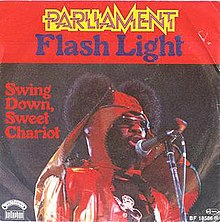Flash Light (song)
| "Flash Light" | |
|---|---|
 German picture sleeve for the single "Flash Light" | |
| Single by Parliament | |
| from the album Funkentelechy Vs. the Placebo Syndrome | |
| B-side | "Swing Down Sweet Chariot" |
| Released | January 1978 |
| Recorded | 1977 |
| Genre | Funk |
| Length | 10:42 (extended 12" version) 5:46 (album version) |
| Label | Casablanca NB 909 |
| Songwriter(s) | George Clinton/Bootsy Collins/Bernie Worrell |
| Producer(s) | George Clinton |
"Flash Light" is a song by funk band Parliament, written by George Clinton, Bernie Worrell, and Bootsy Collins and released in January 1978 on the album Funkentelechy Vs. the Placebo Syndrome.[1] It was the first #1 R&B hit by any of the P-Funk groups and spent four months on the U.S. pop chart, peaking at #16.[2][1] The track became Parliament's second certified million-selling single, following "Give Up the Funk (Tear the Roof Off the Sucker)".[3] "Flash Light" also gave Casablanca Records its first #1 R&B hit. In New Zealand, the song reached #3[4] and is ranked as the #8 hit of 1978.[4]
Background[]
The song's distinctive bass line is often attributed to Bootsy Collins and was originally written for him. However, Collins rejected the part and Bernie Worrell created the line on at least three, possibly four connected Minimoog synthesizers. Worrell also played all the song's keyboard parts.[5] The New York Times described Worrell's synthesized bass as "[a] descending and ascending chromatic line with a meaty tone and a certain swagger, an approach that would spread through funk, new wave, electro, synth-pop and countless other iterations."[6]
Collins contributed to the track by handling drum duties while his older brother Catfish Collins played rhythm guitar. Lead vocals were by bandleader Clinton. Clinton credited Worrell with the idea of composing the song under a motif. Starting out as a jam, Clinton recorded multiple tracks, layering up to 50 voices within the theme of an inclusive love song. The "Da da da dee da da da" chant was based on a chant from a dance at a bar mitzvah party that Clinton had heard from a friend.[7]
Impact and legacy[]
"Flash Light" continued the "Fake the Funk/Your nose will grow/Sir Nose D'Voidoffunk" concept that began with Bootsy's Rubber Band's "The Pinocchio Theory". Its success would greatly influence not only funk music, but also new wave and hip-hop.[8] The Houston Press ranked "Flash Light" as Clinton's most sampled song, finding more than 60 uses, including on Aaliyah's "Back and Forth" and UGK's "Protect and Serve".[9] "Flash Light" was rated #75 in Tablet Magazine's list of 100 Best Jewish Songs.[10] Rolling Stone ranked "Flash Light" #202 on its 2011 list of the 500 Greatest Songs of All Time.[1] The song was sampled by Salt-N-Pepa in their 1986 hit "I'll Take Your Man", and in 2018 by the City Girls for their version of the song. Hip-hop group Digital Underground sampled the song for their hit "Doowutchyalike".
In popular culture[]
Clinton recorded a duet version of the song called "Flashlight (Spaceflight)" for the 1999 film Muppets from Space along with Bill Barretta as Pepe the King Prawn.[11]
The song was used in the Guardians of the Galaxy Vol. 2 credits, and was included in the film's soundtrack.[12] The song was also featured in the films Straight Outta Compton and The Heat.
The song was also featured in the 2013 video game Grand Theft Auto V, on the radio station Space 103.2 in the enhanced versions of the game.
The song was also featured in the TV series Black Lightning on The CW in the premiere episode of the second season, as well as the sitcom Everybody Hates Chris in the eleventh episode of the third season, sung by its guest star, comedian Wayne Brady.
References[]
- ^ Jump up to: a b c (April 7, 2011). "500 Greatest Songs of All Time," Rolling Stone. Retrieved on September 29, 2016.
- ^ Whitburn, Joel (2004). "Top R&B/Hip-Hop Singles: 1942-2004," Record Research, Menomonee Falls, WI. ISBN 0898201608
- ^ Parliament Gold & Platinum albums and singles. RIAA Gold & Platinum database. Retrieved on September 29, 2016.
- ^ Jump up to: a b "The Official New Zealand Music Chart". THE OFFICIAL NZ MUSIC CHART.
- ^ Pareles, Jon. (November 1, 2010) "Honoring the Moment When Music Met Moog," The New York Times. Retrieved on September 29, 2016.
- ^ Pareles, Jon. (June 24, 2016) "Bernie Worrell, Whose Keyboards Left an Imprint on Funk and Hip-Hop, Dies at 72," The New York Times. Retrieved on October 4, 2016.
- ^ Reid, Vernon (2007). The Vibe Q: Raw and Uncut, p. 45. Dafina, Kensington Publishing Corp., New York, New York. ISBN 1601830025. (from original interview with George Clinton entitled, "Brother From Another Planet," (November, 1993)
- ^ Deggans, Eric (June 25, 2016). "Bernie Worrell: The Most Influential Keyboardist You've Probably Never Heard Of," NPR All Things Considered. Retrieved on October 4, 2016.
- ^ Avery, Justin (February 20, 2013). "Top 5 Most Sampled George Clinton Songs," Houston Press. Retrieved on October 4, 2016.
- ^ Rosen, Jody and Kelman, Ari Y. (December 21, 2010)."Song of Songs - 100 Best Jewish Songs," Tablet Magazine. Retrieved on October 5, 2016
- ^ "Muppets from Space (1999)".
- ^ http://www.thewrap.com/guardians-of-the-galaxy-new-clip
- 1977 songs
- 1978 singles
- Parliament (band) songs
- Songs written by George Clinton (funk musician)
- Casablanca Records singles
- Songs written by Bootsy Collins
- Songs written by Bernie Worrell